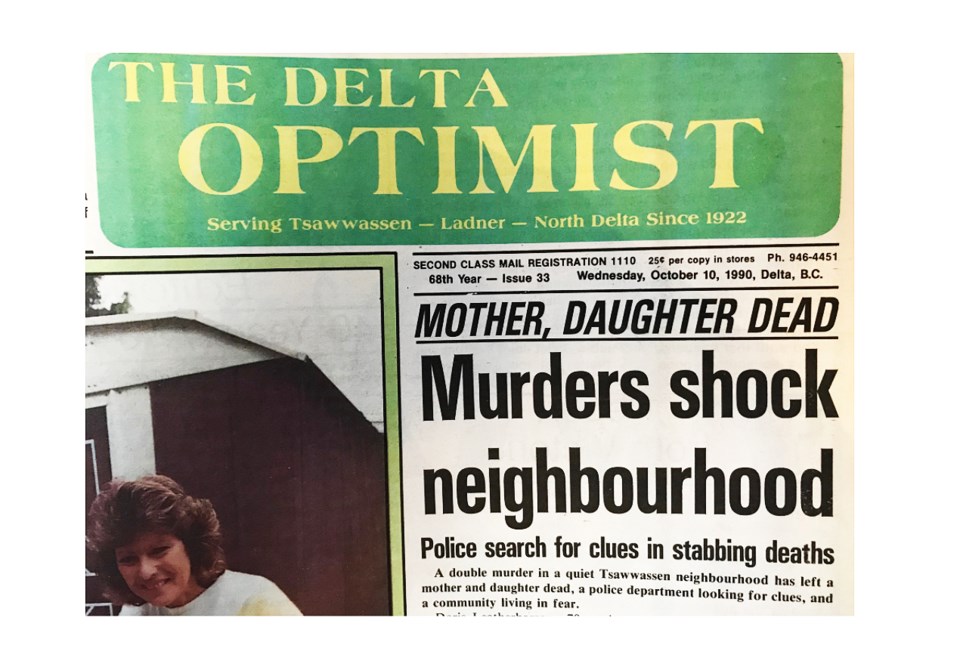Warning: This story contains details that may be distressing to some readers.
Canadians were transfixed in horror during the murder investigation into the deaths of two Tsawwassen, B.C., women orchestrated by a teenager trying to get his hands on the family's millions.
In October 1992, Sharon Huenemann, 47, and Doris Leatherbarrow, 69, were found stabbed and bludgeoned to death.
What made the gruesome case even more mind-boggling was that the person behind their violent deaths was Sharon's only child, 18-year-old Darren Huenemann.
During the trial, the court heard the preppy teen had offered Derik Christopher Lord, 17, and David Muir, 16, a monthly salary, a car and a house for murdering his mother and grandmother. The three had met in high school in Victoria.
Huenemann was after his grandmother's estimated $4-million fortune from operating a successful clothing chain.
On Oct. 5, 1992, Lord and Muir took a ferry from Victoria to Tsawwassen, where the women invited them in for a lasagna dinner. Investigators would report they found the table set for four with uneaten salad and lasagna on the table when they arrived at the gruesome scene.
At about 5:30 p.m., the teens exchanged a nod, a prearranged signal, and attacked, hitting them in the head with crowbars before slitting their throats with kitchen knives.
Medical evidence at trial showed both women had been rendered unconscious after blows to the head with a blunt instrument. Fatal wounds severed significant blood vessels in their throats.
The scene was staged to look like a robbery, but money, expensive jewelry and other high-value articles had been left behind.
Police soon learned that in the months preceding the murders, Huenemann had told people that he planned to kill his "granny" so that he would inherit her money. Within two months, that knowledge led police to look at Huenemann's friends.
Muir and Lord weren't initially on the police radar but soon became principal suspects in the case.
During the investigation, police visited Lord's home to ask if he knew Sharon, who he recalled as a nice lady. When further asked if he had heard any rumours or had suspicions about her murder, he said he had not but revealed he had been in Tsawwassen with Muir on that day.
It was the first time police heard of Muir, who was outside in Lord's yard.
When Lord questioned what they were doing the night of the killings, he said that Huenemann had picked them up, and they had gone to Victoria's Chinatown. With them was Amanda Cousins, who would prove to be a key person in the prosecution.
However, a Lower Mainland taxi driver had already said he had picked up the teens from a ferry and driven them to Tsawwassen.
Two weeks later, police spoke with Muir — this time with his parents in their home.
He was not a suspect until a week later when Leatherbarrow's neighbours identified him from a photo lineup.
Both Lord and Muir were soon identified as having been on Leatherbarrow's front lawn.
The day of the death was not the first time they had been in the neighbourhood.
Two weeks before, they had been picked up by a taxi at a location near the Leatherbarrow residence and driven back to the Tsawwassen ferry terminal.
It's here that Cousins enters the story.
She testified to having conversations with Huenemann, where he described his plan to kill his mother and grandmother to get the inheritance. Cousins also said Huenemann told her Lord and Muir would do the actual killing.
Huenemann told Cousins how Lord and Muir would enter the house, kill the two women, make the crime look like a robbery, and then return to Vancouver Island's Swartz Bay on the ferry.
It had initially been planned for Sept. 21, but Muir and Lord could not find the house — the code name for which was 'the mailbox.'
While his mother and grandmother were being killed, Huenemann had dinner with Cousins, and she was with him when he picked up the teens at Swartz Bay.
She said both described in detail how they had carried out the plan, a plan Huenemann had explained to her two weeks earlier.
The women were knocked out with crowbars provided by Huenemann and then cut their throats with kitchen knives.
There was also discussion about the alibi that all would provide if questioned by the police.
In court, evidence was intercepted from phone calls indicating all three teens were concerned about the police investigation.
Huenemann was tried and convicted by a jury of first-degree murder.
He has been portrayed as perverse, identifying with the depraved Roman Emperor Caligula. He appeared to live in a fantasy world where he could have wealth and invade Brunei to become its divine ruler.
An insanity plea was an option at trial, but Huenemann chose not to take it.
A jury took three hours to convict him of first-degree murder. He received life without parole for 25 years.
In adult court, Muir and Lord were ordered to face first-degree murder charges. Both were convicted and sentenced to a term of life imprisonment without eligibility for parole for 10 years.
Huenemann, using his biological father's surname, Gown, applied for parole in 2017. He was denied and remains at a correctional facility in Quebec.
The lasting effects of the teen's behaviour can be best illustrated by the trials of Lord's family. He has maintained he is innocent of the charge and, as such, has not been involved in rehabilitation programs as he must admit guilt.
As a Métis, Lord was also allowed time with Elders, work the court said was of no help due to his lack of participation.
Lord's mother, Elouise, has consistently backed up her son. She maintains she was at home that night and saw all three boys in the basement. At the same time, Lord's father has claimed that it is an attempt by the corrections system to extort a confession.
Muir admitted his guilt and was granted full parole in 2003.





